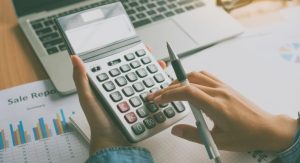Income tax is usually deducted automatically from employed people’s wages and pensions. But the HM Revenue and Customs (HMRC) uses a self-assessment system to collect income tax from self-employed people like business owners, sole traders, and freelancers.
Part of this self-assessment is calculating payments on account. But what are these payments, and how can you know what your payments are? This is your concise guide on how to navigate payments on account in self-assessment.
What are Payments on Account?
If you are self-employed and submit a self-assessment tax return, HMRC will send you a tax calculation and self-assessment statement. This statement shows several things. These include the tax currently owed, payments you have made, and payments on account due.

Payments on account are the advance payments made towards your self-assessment tax bill, and there are two installments of these payments per year. Payments on account are due on 31st January, and 31st July.
The self-assessment statement also shows any outstanding amounts that have carried over from the previous tax year.
The Purpose of Payments on Account
So, payments on account are two payments that together make up the total of the tax bill for self-assessments. But what is the reason for making two payments? Payments on account make life much easier for self-employed people.
These payments spread out their tax obligations so they don’t have to pay their entire tax bill all at once. Therefore, payments on account in self-assessment ensure that self-employed people are not overburdened by a once-off bill, yet don’t fall into arrears.
If that all sounds complicated, don’t fret. With the right knowledge, it’s easy to navigate your payments on account for self-assessment.
Navigating Payments on Account for Self-Assessment
Payments on account apply to people who have to submit a self-assessment tax return. And there are a few factors that determine whether you have to file a self-assessment. Check if the points below apply to you.
- Self-employed and earning more than £1,000 (before tax relief deductions)
- Earning a taxable income of over £150,000 annually
- Receiving other income such as tips and commissions, interest on savings, dividends, or investments
- Receiving untaxed income such as property rental income
- Partner in a business partnership
- Liable to pay Capital Gains Tax (CGT) on the sale of something that increased in value *property, investments, etc)
Investments and Self-Assessments
It can be difficult to sustain your income as a self-employed person during tough economic times. That is why many people turn to investing. The flexible investment sector helps investors find and compare investment companies that offer diverse opportunities in a wide range of assets, even during a recession!
But as you can see above, investments play a role in your self-assessment. If you are considering an investment trust as a sustainable source of additional income, you may be wondering how this affects your self-assessment.
Despite its name, an investment trust is not a trust. It is a pooled investment vehicle in the form of a listed UK tax-resident company. The good news is that, when approved by the HMRC, it is exempt from tax on chargeable gains. Therefore, such an investment will not be subject to Capital Gains Tax.
How to Calculate Payments on Account?

Payments on account are for the work that you expect in the future. They do not apply to any work you have already completed. There are two payments a year and each is calculated as half of the previous year’s tax bill.
You can easily calculate your upcoming payment on account by simply halving your previous year’s tax bill. Then you will have an estimate for the two payments to make on your account.
Take note that self-assessment can sometimes apply to people who are not self-employed too. For example, people who receive yearly income from property, a trust, or a settlement may need to do a self-assessment. There are a few other criteria too, so check here if this applies to you.
When Payments on Account Don’t Match the Actual Tax Bill?
Business income tends to fluctuate from year to year. An estimate is just that, an estimate, and will have to be reconciled when payments on account don’t match the actual tax bill.
If your payments on account don’t cover your total tax bill, you will have to make an additional payment, known as a balancing payment. You will find this in your self-assessment statement (see section one above).
On the other hand, if your payments on account have exceeded your actual tax bill. In this case, you have overpaid your tax and are entitled to a refund. These overpayments are processed once you have submitted your next income tax return. You can then choose how your refund will be paid out to you.
Author Profile

- Blogger by Passion | Contributor to many Business Blogs in the United Kingdom | Fascinated to Write Blogs in Business & Startup Niches |
Latest entries
 BusinessJanuary 9, 20266 Fastest Cash House Buyers in the UK 2026
BusinessJanuary 9, 20266 Fastest Cash House Buyers in the UK 2026 BusinessDecember 12, 2025The Smart SME’s Guide to Future-Proofing Physical Assets
BusinessDecember 12, 2025The Smart SME’s Guide to Future-Proofing Physical Assets FinanceOctober 28, 2025How to Measure the ROI of Your Promotional Product Campaigns?
FinanceOctober 28, 2025How to Measure the ROI of Your Promotional Product Campaigns? Home & LivingOctober 4, 2025Moving Forward When Leicester Family Dynamics Change
Home & LivingOctober 4, 2025Moving Forward When Leicester Family Dynamics Change





